Looking for a celebration of music in words to while away your lazy summer days?
There Was Nothing You Could Do: Bruce Springsteen’s “Born In The U.S.A.” and the End of the Heartland – Steven Hyden (2024)
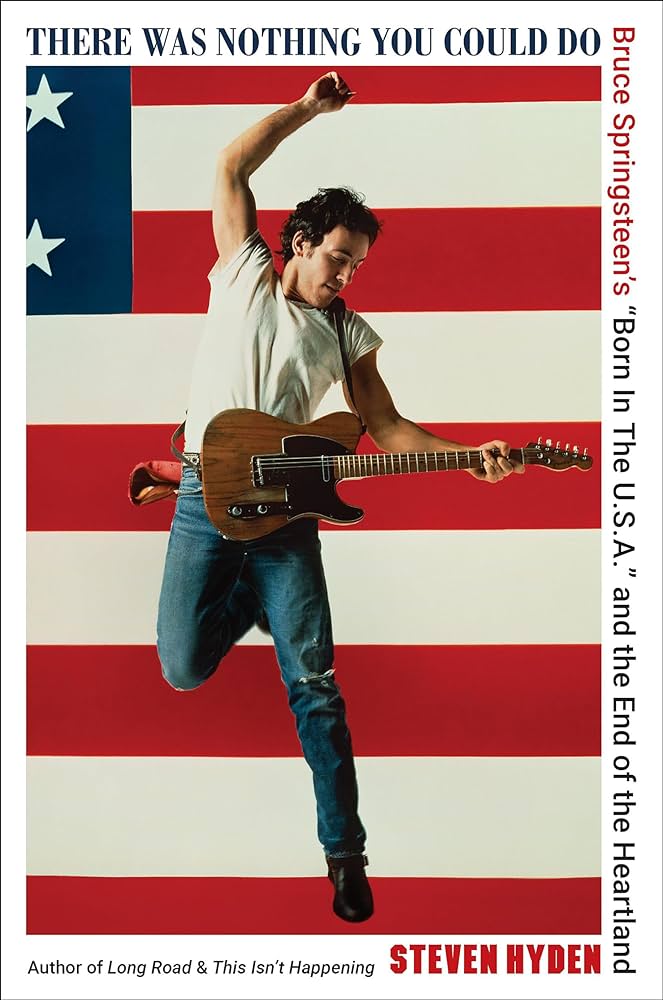
One of my favorite music writers, Steven Hyden, has once again taken a subject that you think you understood and turned it upside down to expose its hidden and most lasting attributes. This time it is the inimitable figure of Bruce Springsteen and his gargantuan 1984 album, Born in the U.S.A., its ensuing tour, and the launching of “heartland rock.” In place of a blow by blow of the album’s composing and recording, Hyden dissects its impact in the greater context of mid-1980s pop culture, politics, media, and social issues that Springsteen’s music reflected and deflected.
The arc of the book (and its subject) is an artist’s journey to remain tethered to the commitment of a spiritual center for his audience, his country, his idiom, and an embrace and expression of “community” that still evades us today. For Springsteen, the making and touring of Born in the U.S.A. arrived as the culmination of his ascent to superstardom with tales of youthful rebellion, broken dreams, apathetic adulthood and finding hope in a forlorn construct.
Mostly, There Was Nothing You Could Do is a damn fun read. Hyden’s conversational style balances his preternatural knack for historical perspectives and his endearing personal anecdotes bring the reader deeper into his analysis. Hell, it was no less a Herculean feat to convince me to reconsider an album that through incessant play drove me to near madness during my summer working at a record store in 1985. Stripped of all its mythos and cultural resonance, Born in the U.S.A. really is a fine rock and roll statement from a master.
Madonna: A Rebel Life – Mary Gabriel (2023)
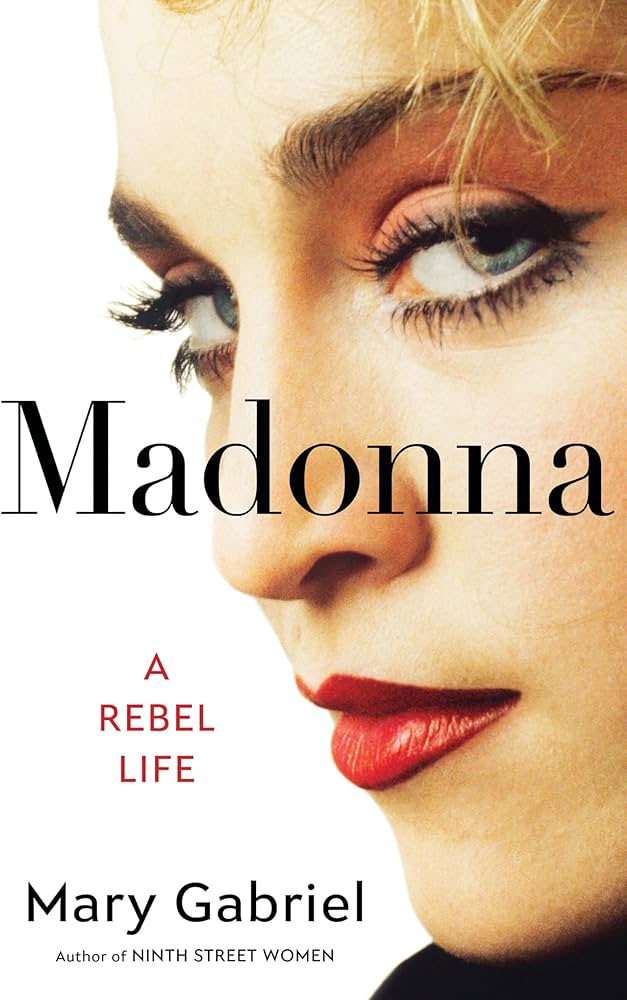
Author Mary Gabriel leaves no stone unturned in providing an exhaustive and lengthy narrative of Madonna Louise Ciccone’s life, never forgetting to place the origins, idiosyncrasies, and passions of the woman-as-artist first. Aptly titled, Madonna: A Rebel Life presents a singular figure in pop culture that hurdled barriers and leaned into social and gender issues from sexual identity, personal autonomy, and motherhood, as she remained relevant in a youth-oriented business by growing old defiantly, if not gracefully.
The highlight of the book is Madonna’s New York City days of the late 1970s into the very early months of a decade she would come to own – the eighties, when she embraced the city’s burgeoning artistic gay culture and its colorfully enigmatic figures, mostly its influence on fashion, music, and dance, and how she never abandoned the lessons she learned from it. Later, when most of the world shied from the responsibility of confronting the toll of AIDS on that community and beyond, she was an active voice for its victims and a virulent opponent of its stigmas.
Gabriel also balances Madonna’s personal life – her loves, failed marriages, and the dramatic on again/off again connection with her beloved brother, Chris, who was a seminal figure in her entourage for years, helping her to navigate her travails and successes in music video and film worlds, until their rift later in her career.
It took this large and extensive a volume to remind me, and I lived through all of it, of the miraculously unrivaled popularity of Madonna’s music and performances lasting long after her staunchest competitors from Michael Jackson to Prince had faded into their niches.
Tonechaser – Steve Rosen (2022)

Steve Rosen, longtime music journalist with a concentration on prying secrets from guitarists across the generations from Pete Townshend to Richie Blackmore and beyond for Guitar World and Guitar Player, had the good fortune of gaining the confidence of a young Eddie Van Halen at the beginning of his ascent as one of the most important musical innovators in the history of rock. Tonechaser (the title taken from how Van Halen defined his search for the perfect sound from handmade guitars to colossal amplification) is a memoir of Rosen’s days and nights speaking and hanging with the man he affectionately calls Edward throughout.
Rosen’s gushing descriptions of Van Halen sitting in his living room playing vintage Les Pauls, noodling in the studio, and even jamming with him will be a treat for true fans, but where the book really soars is the guitarist’s agonizingly open conversations with the author on life, love, insecurities, his deepest feelings about his Van Halen bandmates, specifically his relationship with his brother, drummer Alex, and the primacy of his dad, who dies during the telling.
The taped interviews that make up Tonechaser (much of it a revelation even to Rosen) fills the text with the secrets of a musical pioneer, who changed the instrument for evermore, but they also reveal an artist grappling with originality, creative compromise, and an obsession to discover new sounds to share with the world. And, at its core, the book is a genuinely touching tale of friendship in the unpredictable swirl of rock fame.
Livin’ Just to Find Emotion: Journey and the Story of American Rock – David Hamilton Golland (2024)
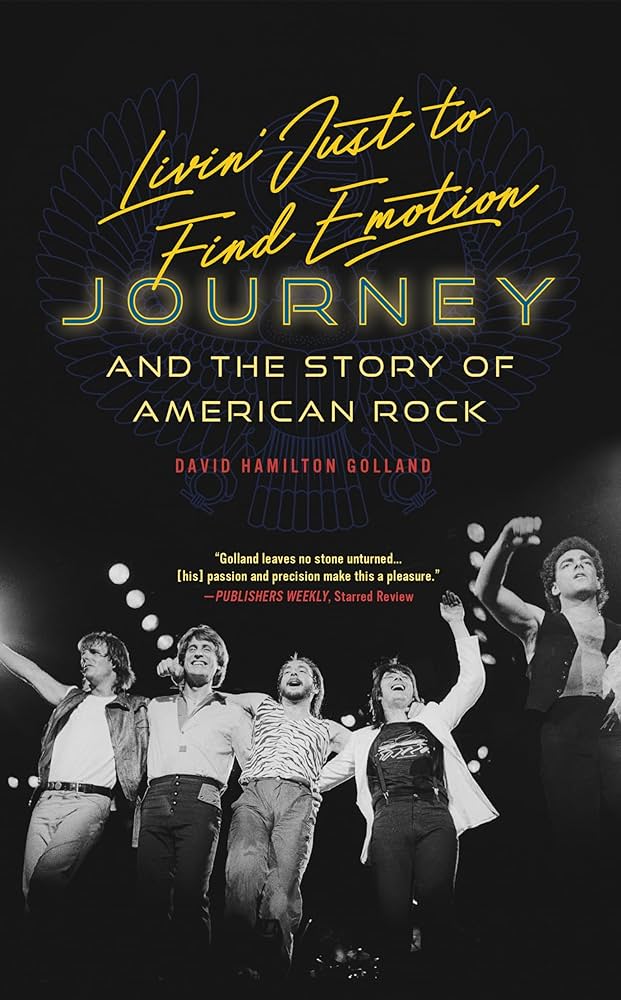
Formed from the remnants of the original Santana band that played a legendary set at Woodstock in 1969, Journey began as a progressive rock act with jazz and blues undertones led by teen guitar prodigy Neal Schon and organ player and main vocalist Gregg Rolie. Author David Hamilton Golland traces the winding road the group took as it morphed into a multi-platinum worldwide smash that dominated the music charts in the 1980s, survived multiple lineup changes that threatened to doom the act forever, then made an unlikely resurrection to become an American institution and thriving concert draw 50 years after its first shows.
Golland’s main thesis is that Journey was a white group that took Black music styles and successfully incorporated them into a rock pop amalgamation that was eventually embraced by eager white audiences looking for something fresh and exciting as the 1970s came to an end. The addition of powerhouse white-soul singer Steve Perry is indeed the crucial moment in the Journey story, and the string of hit songs that Perry, an avowed fan of Sam Cooke and other R&B singers of the 1960s, wrote, co-wrote, and sang lends credence to Golland’s central theme.
Perry’s years of triumph are only part of the Journey story; Golland shows how the group persevered after his departure, with unknown singer Arnel Pineda, who stepped into Perry’s shoes to not only save the group but help usher in an unexpected Journey renaissance – the hit, “Don’t Stop Believing” becoming a cultural touchstone, as did Journey become icons whose long list of hit songs formed the soundtrack of the lives of multiple generations.
Well-paced, exhaustively researched, with in-depth analysis of the Journey catalog and the background stories of various key members of the group, Livin’ Just to Find Emotion is a great read for any fan of classic rock and those who like an epic tale of triumph, tribulation, and redemption.
-Review by Chris Barrera
On Michael Jackson – Margo Jefferson (2006)
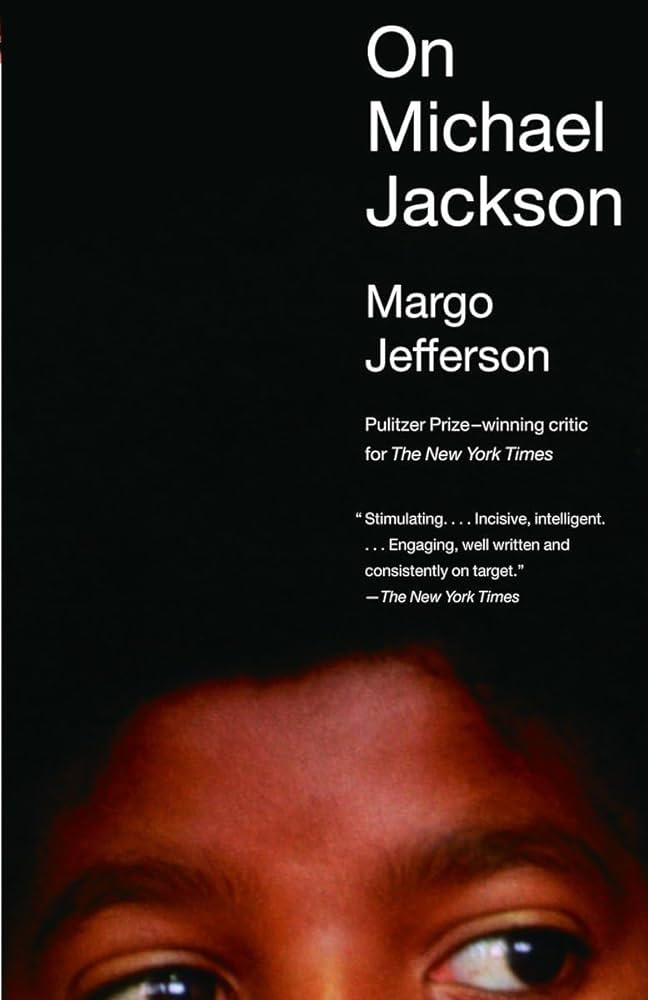
Pulitzer Prize winning author, essayist and professor, Margo Jefferson, who reviewed music and pop culture for 23 years at The New York Times, takes a pass at one of the most controversial and celebrated figures in popular music: the self-anointed King of Pop, Michael Jackson. Published only a couple of years before Jackson’s untimely death in 2009, the many faces and facets of his complicated aura and story are given in-depth deconstruction from personality to persona, his place in the African American experience – both musically and publicly – and the legacy of his entire canon, from the enormous achievements of the Jackson 5 to his spectacularly successful solo career.
Jefferson pulls no punches while eschewing sensationalism and humanizing a very dehumanized figure placed in the middle to later stages of the American Century. On Michael Jackson frames its subject as our equally welcomed as rejected freakshow, and his uneasy comfort within that vortex. Jefferson uses this concise uncovering of Jackson as pop star and celebrity/racial archetype to guide us through the horrifying accusations of child molestation, legal troubles, tabloid exploitation, and eventual defiance.
Having read several books on Jackson, this one stands above the rest for its brevity, bravery, and mindful approach, challenging readers to reconsider, recognize, and, best of all, understand the underlying chaos – both self-inflicted and socially infiltrated – that made Michael Jackson who he was and what he would become.
Like any celebrity, Jackson is not merely a two-dimensional headline but a complicated three-dimensional human, and it is within this conflict that Jefferson finds where they ultimately meet.
Dead Elvis: A Chronicle of a Cultural Obsession – Greil Marcus (1991)
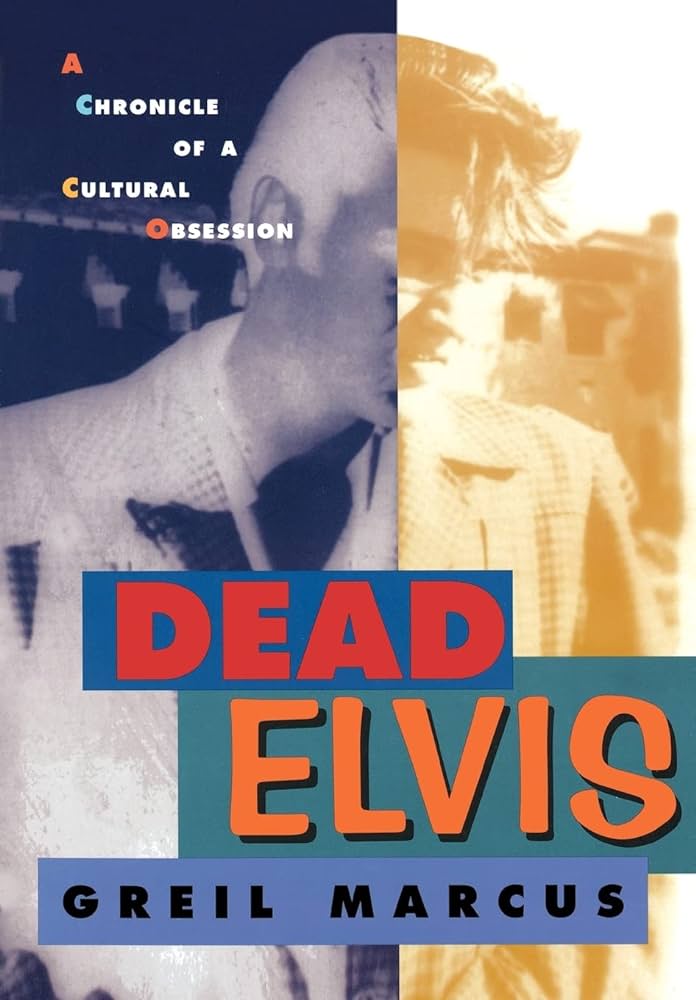
Not only is Greil Marcus arguably the best music critic and essayist of our time, but the timing of his engagingly pithy, humorous, and insightful Dead Elvis acts as the last and comprehensive word on a phenomenon that once dominated our culture, but has since faded from memory. Published in 1991 when Elvis Presley’s impact on America’s psyche was still glaringly apparent, and his cultural resurrection (countless “Elvis is Alive sightings” notwithstanding) ubiquitous, the book is a reflection on not only Presley’s seismic effect on our sexual, racial, societal, and political construct but how our nation defined and redefined him.
The Elvis of Dead Elvis is legion, and Marcus covers its strange journey through questionable biography and reimagined lore, cleverly winding his way through the years after his death in 1977 into the facets of the fallen King’s immense shadow, one that was equally disdained as worshipped. And while in such an undertaking an author could get lost in the symbol of Elvis over his vast catalog from rockabilly to gospel to schlock pop, Marcus’s prose truly sings is his passion for the music.



